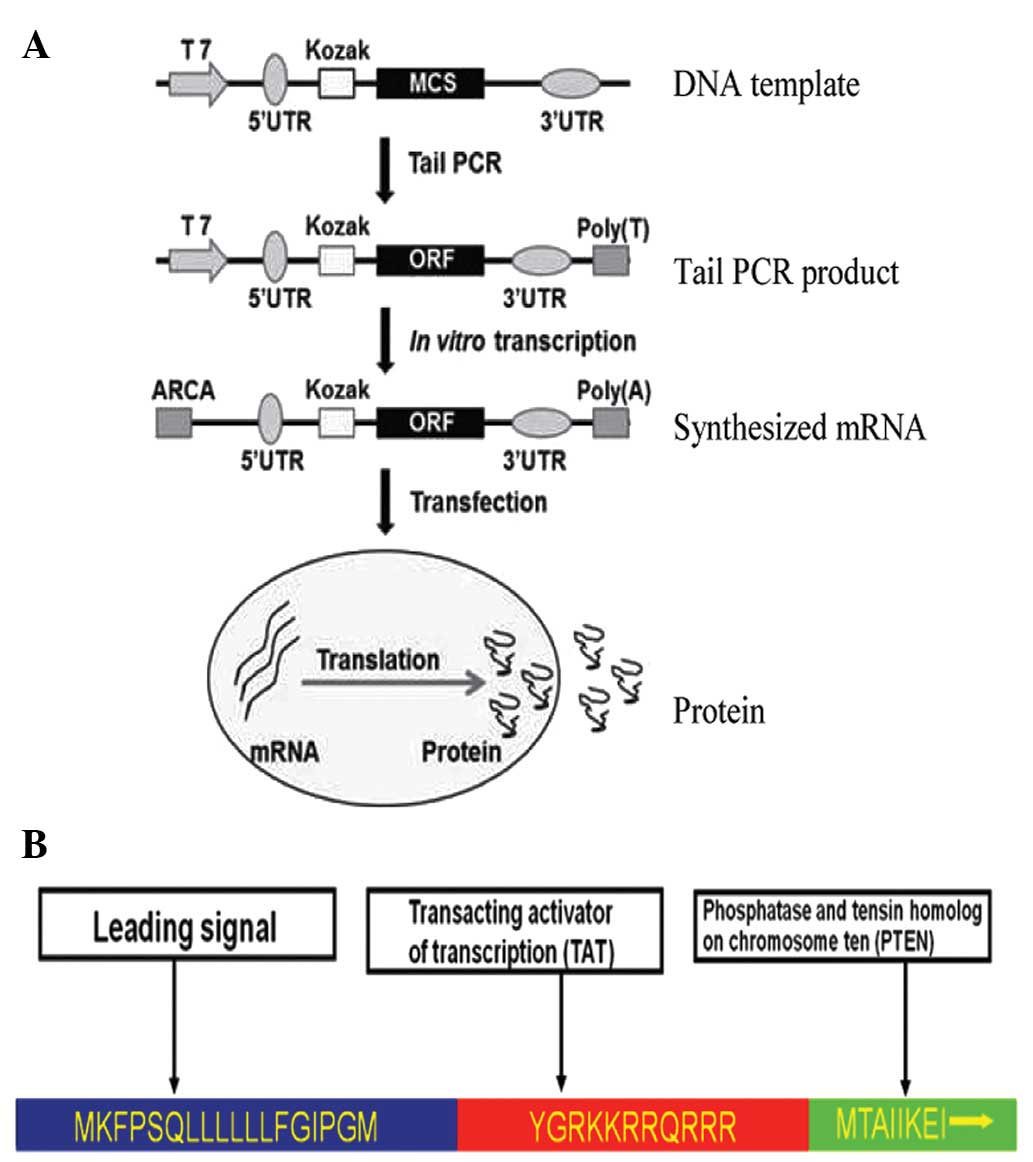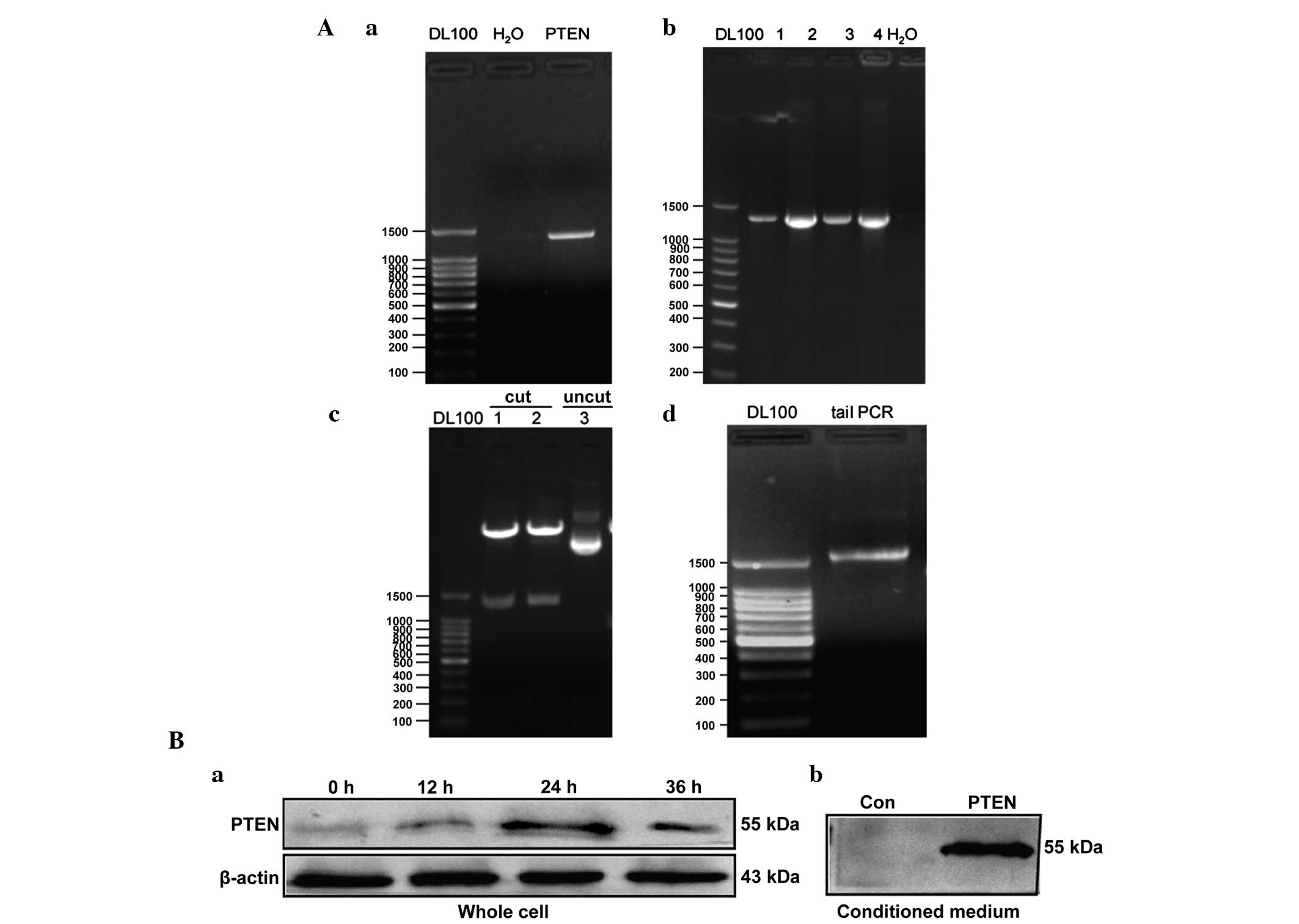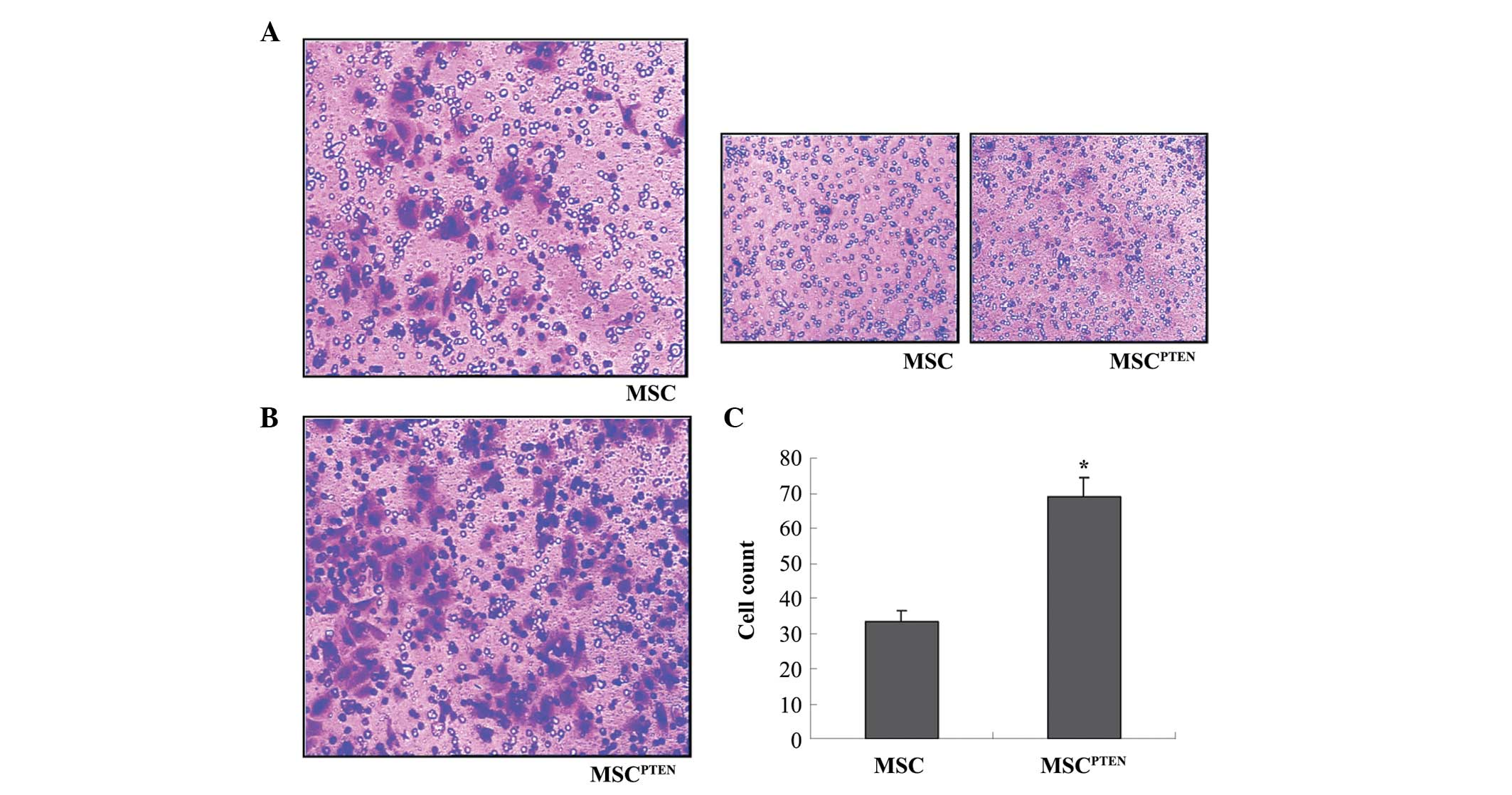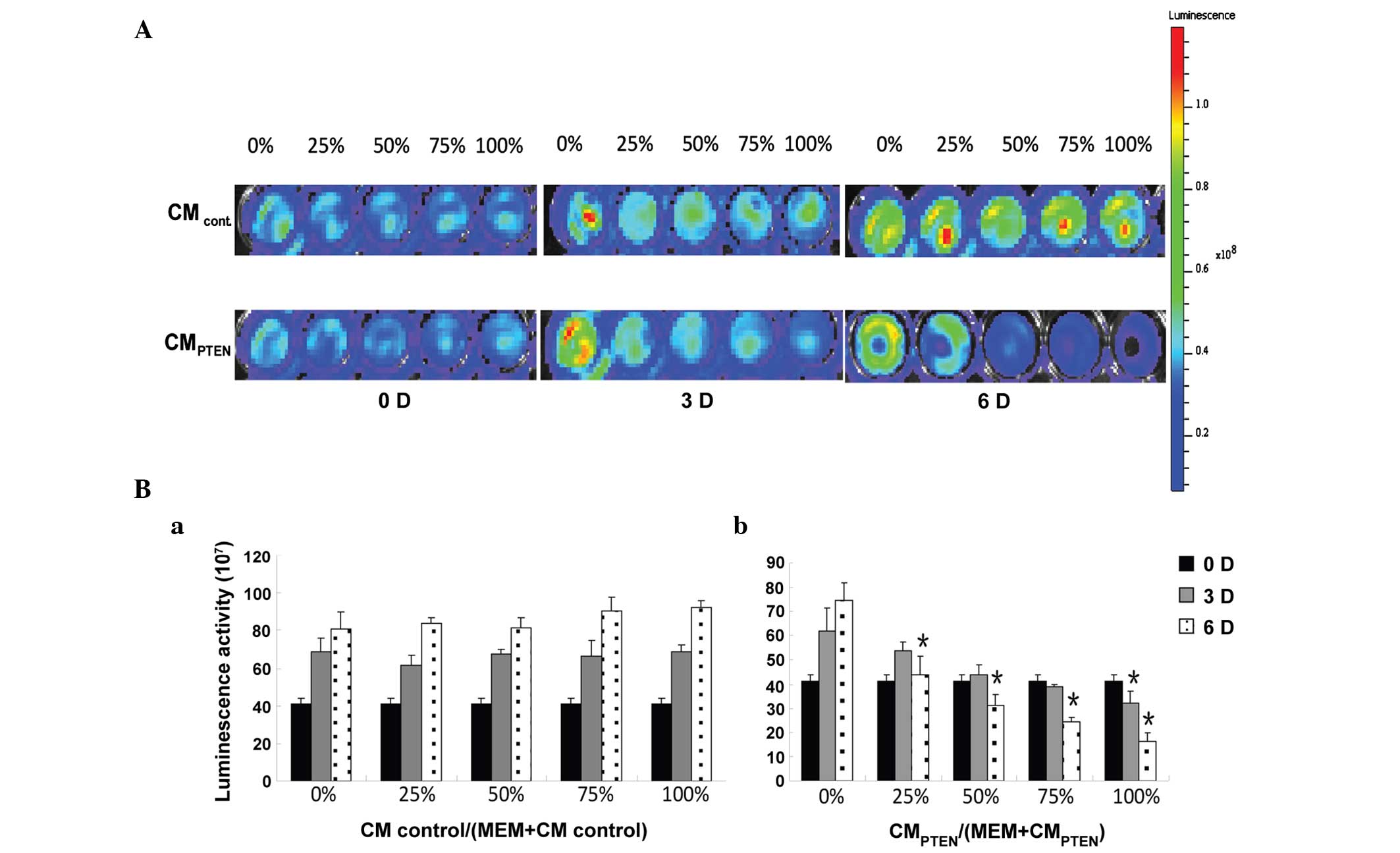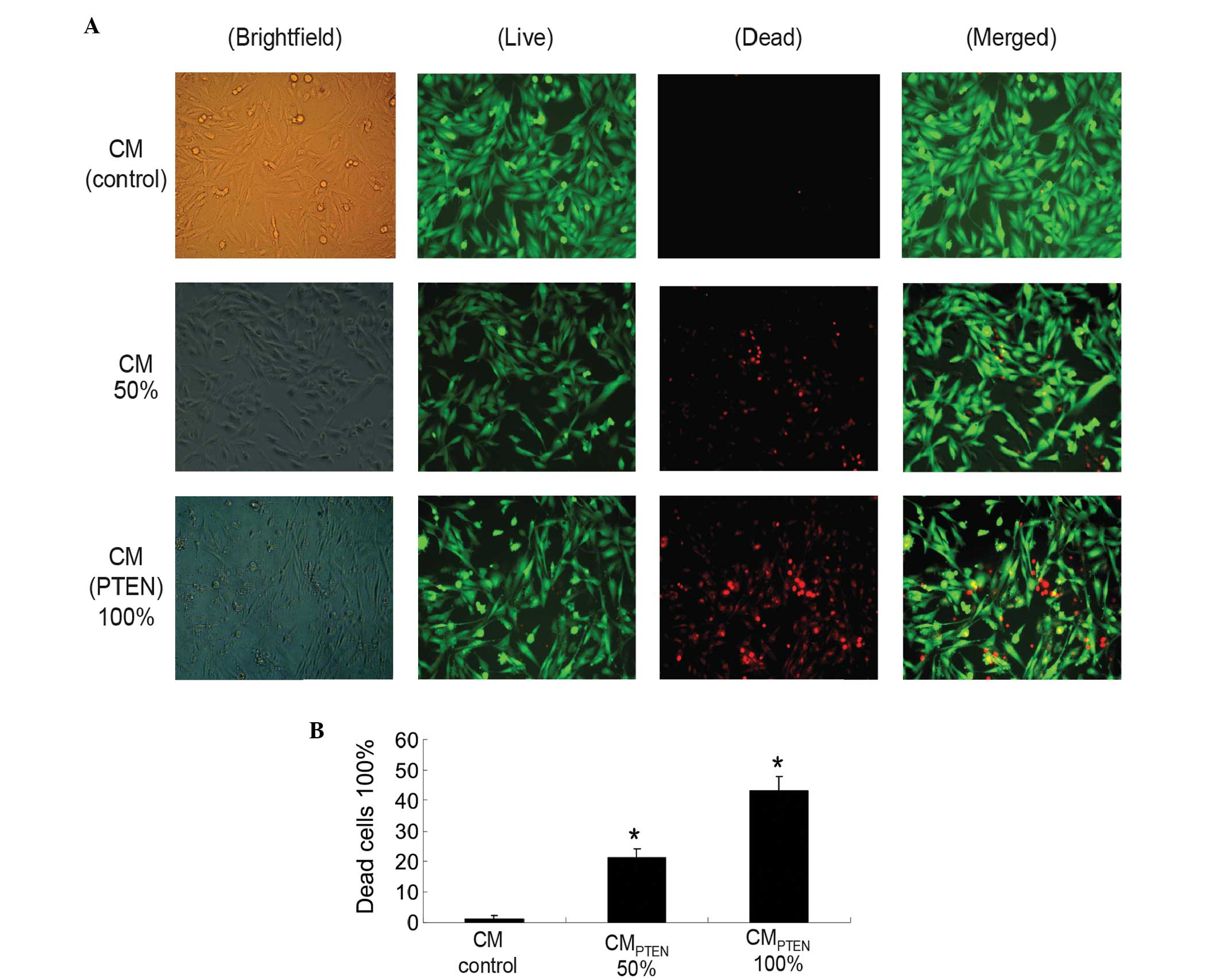|
1
|
Van Meir EG, Hadjipanayis CG, Norden AD,
Shu HK, Wen PY and Olson JJ: Exciting new advances in
neuro-oncology: The avenue to a cure for malignant glioma. CA
Cancer J Clin. 60:166–193. 2010. View Article : Google Scholar : PubMed/NCBI
|
|
2
|
Westphal M and Lamszus K: The neurobiology
of gliomas: From cell biology to the development of therapeutic
approaches. Nat Rev Neurosci. 12:495–508. 2011. View Article : Google Scholar : PubMed/NCBI
|
|
3
|
Ferguson SD: Malignant gliomas: Diagnosis
and treatment. Dis Mon. 57:558–569. 2011. View Article : Google Scholar : PubMed/NCBI
|
|
4
|
Sun XY, Nong J, Qin K, Warnock GL and Dai
LJ: Mesenchymal stem cell-mediated cancer therapy: A dual-targeted
strategy of personalized medicine. World J Stem Cells. 3:96–103.
2011. View Article : Google Scholar : PubMed/NCBI
|
|
5
|
Tabatabai G, Wick W and Weller M: Stem
cell-mediated gene therapies for malignant gliomas: A promising
targeted therapeutic approach? Discov Med. 11:529–536.
2011.PubMed/NCBI
|
|
6
|
Loebinger MR and Janes SM: Stem cells as
vectors for antitumour therapy. Thorax. 65:362–369. 2010.
View Article : Google Scholar : PubMed/NCBI
|
|
7
|
Dai LJ, Moniri MR, Zeng ZR, Zhou JX, Rayat
J and Warnock GL: Potential implications of mesenchymal stem cells
in cancer therapy. Cancer Lett. 305:8–20. 2011. View Article : Google Scholar : PubMed/NCBI
|
|
8
|
Zhang X, Zhang L, Xu W, Qian H, Ye S, Zhu
W, Cao H, Yan Y, Li W, Wang M, et al: Experimental therapy for lung
cancer: Umbilical cord-derived mesenchymal stem cell-mediated
interleukin-24 delivery. Curr Cancer Drug Targets. 13:92–102. 2013.
View Article : Google Scholar : PubMed/NCBI
|
|
9
|
Zhang X, Zhang L, Xu W, Qian H, Ye S, Zhu
W, Cao H, Yan Y, Li W, Wang M, et al: Experimental therapy for lung
cancer: umbilical cord-derived mesenchymal stem cell-mediated
interleukin-24 delivery. Curr Cancer Drug Targets. 13:92–102. 2013.
View Article : Google Scholar : PubMed/NCBI
|
|
10
|
Sun XY, Nong J, Qin K, Lu H, Moniri MR,
Dai LJ and Warnock GL: MSC(TRAIL)-mediated HepG2 cell death in
direct and indirect co-cultures. Anticancer Res. 31:3705–3712.
2011.PubMed/NCBI
|
|
11
|
Rodríguez R, García-Castro J, Trigueros C,
Arranz García M and Menéndez P: Multipotent mesenchymal stromal
cells: clinical applications and cancer modeling. Adv Exp Med Biol.
741:187–205. 2012. View Article : Google Scholar : PubMed/NCBI
|
|
12
|
Fritz V and Jorgensen C: Mesenchymal stem
cells: An emerging tool for cancer targeting and therapy. Curr Stem
Cell Res Ther. 3:32–42. 2008. View Article : Google Scholar : PubMed/NCBI
|
|
13
|
Yagi H, Soto-Gutierrez A, Parekkadan B,
Kitagawa Y, Tompkins RG, Kobayashi N and Yarmush ML: Mesenchymal
stem cells: Mechanisms of immunomodulation and homing. Cell
Transplant. 19:667–679. 2010. View Article : Google Scholar : PubMed/NCBI
|
|
14
|
Amara I, Touati W, Beaune P and de Waziers
I: Mesenchymal stem cells as cellular vehicles for prodrug gene
therapy against tumors. Biochimie. 105:4–11. 2014. View Article : Google Scholar : PubMed/NCBI
|
|
15
|
Ren C, Kumar S, Chanda D, Chen J, Mountz
JD and Ponnazhagan S: Therapeutic potential of mesenchymal stem
cells producing interferon-alpha in a mouse melanoma lung
metastasis model. Stem Cells. 26:2332–2338. 2008. View Article : Google Scholar : PubMed/NCBI
|
|
16
|
Studeny M, Marini FC, Champlin RE,
Zompetta C, Fidler IJ and Andreeff M: Bone marrow-derived
mesenchymal stem cells as vehicles for interferon-beta delivery
into tumors. Cancer Res. 62:3603–3608. 2002.PubMed/NCBI
|
|
17
|
Li X, Lu Y, Huang W, Xu H, Chen X, Geng Q,
Fan H, Tan Y, Xue G and Jiang X: In vitro effect of
adenovirus-mediated human Gamma Interferon gene transfer into human
mesenchymal stem cells for chronic myelogenous leukemia. Hematol
Oncol. 24:151–158. 2006. View
Article : Google Scholar : PubMed/NCBI
|
|
18
|
Tang XJ, Lu JT, Tu HJ, Huang KM, Fu R, Cao
G, Huang M, Cheng LH, Dai LJ and Zhang L: TRAIL-engineered bone
marrow-derived mesenchymal stem cells: TRAIL expression and
cytotoxic effects on C6 glioma cells. Anticancer Res. 34:729–734.
2014.PubMed/NCBI
|
|
19
|
Sasportas LS, Kasmieh R, Wakimoto H,
Hingtgen S, van de Water JA, Mohapatra G, Figueiredo JL, Martuza
RL, Weissleder R and Shah K: Assessment of therapeutic efficacy and
fate of engineered human mesenchymal stem cells for cancer therapy.
Proc Natl Acad Sci USA. 106:4822–4827. 2009. View Article : Google Scholar : PubMed/NCBI
|
|
20
|
Rosenecker J, Huth S and Rudolph C: Gene
therapy for cystic fibrosis lung disease: Current status and future
perspectives. Curr Opin Mol Ther. 8:439–445. 2006.PubMed/NCBI
|
|
21
|
Hacein-Bey-Abina S, Hauer J, Lim A, Picard
C, Wang GP, Berry CC, Martinache C, Rieux-Laucat F, Latour S,
Belohradsky BH, et al: Efficacy of gene therapy for X-linked severe
combined immunodeficiency. N Engl J Med. 363:355–364. 2010.
View Article : Google Scholar : PubMed/NCBI
|
|
22
|
Leonhardt C, Schwake G, Stögbauer TR,
Rappl S, Kuhr JT, Ligon TS and Rädler JO: Single-cell mRNA
transfection studies: Delivery, kinetics and statistics by numbers.
Nanomedicine (Lond). 10:679–688. 2014.
|
|
23
|
Wang XL, Hu P, Guo XR, Yan D, Yuan Y, Yan
SR and Li DS: Reprogramming human umbilical cord mesenchymal
stromal cells to islet-like cells with the use of in
vitro-synthesized pancreatic-duodenal homebox 1 messenger RNA.
Cytotherapy. 16:1519–1527. 2014. View Article : Google Scholar : PubMed/NCBI
|
|
24
|
Guo XR, Wang XL, Li MC, Yuan YH, Chen Y,
Zou DD, Bian LJ and Li DS: PDX-1 mRNA-induced reprogramming of
mouse pancreas-derived mesenchymal stem cells into
insulin-producing cells in vitro. Clin Exp Med. 10:152–160.
2014.
|
|
25
|
Warren L, Manos PD, Ahfeldt T, Loh YH, Li
H, Lau F, Ebina W, Mandal PK, Smith ZD, Meissner A, et al: Highly
efficient reprogramming to pluripotency and directed
differentiation of human cells with synthetic modified mRNA. Cell
Stem Cell. 7:618–630. 2010. View Article : Google Scholar : PubMed/NCBI
|
|
26
|
Zangi L, Lui KO, von Gise A, Ma Q, Ebina
W, Ptaszek LM, Später D, Xu H, Tabebordbar M, Gorbatov R, et al:
Modified mRNA directs the fate of heart progenitor cells and
induces vascular regeneration after myocardial infarction. Nat
Biotechnol. 31:898–907. 2013. View
Article : Google Scholar : PubMed/NCBI
|
|
27
|
Liu W, Zhou Y, Reske SN and Shen C: PTEN
mutation: Many birds with one stone in tumorigenesis. Anticancer
Res. 28:3613–3619. 2008.PubMed/NCBI
|
|
28
|
Ciuffreda L, Falcone I, Incani UC, Del
Curatolo A, Conciatori F, Matteoni S, Vari S, Vaccaro V, Cognetti F
and Milella M: PTEN expression and function in adult cancer stem
cells and prospects for therapeutic targeting. Adv Biol Regul.
56:66–80. 2014. View Article : Google Scholar : PubMed/NCBI
|
|
29
|
Muniyan S, Ingersoll MA, Batra SK and Lin
MF: Cellular prostatic acid phosphatase, a PTEN-functional
homologue in prostate epithelia, functions as a prostate-specific
tumor suppressor. Biochim Biophys Acta. 1846:88–98. 2014.PubMed/NCBI
|
|
30
|
Chalhoub N and Baker SJ: PTEN and the
PI3-kinase pathway in cancer. Annu Rev Pathol. 4:127–150. 2009.
View Article : Google Scholar : PubMed/NCBI
|
|
31
|
Moniri MR, Sun XY, Rayat J, Dai D, Ao Z,
He Z, Verchere CB, Dai LJ and Warnock GL: TRAIL-engineered
pancreas-derived mesenchymal stem cells: Characterization and
cytotoxic effects on pancreatic cancer cells. Cancer Gene Ther.
19:652–658. 2012. View Article : Google Scholar : PubMed/NCBI
|
|
32
|
Nakamizo A, Marini F, Amano T, Khan A,
Studeny M, Gumin J, Chen J, Hentschel S, Vecil G, Dembinski J, et
al: Human bone marrow-derived mesenchymal stem cells in the
treatment of gliomas. Cancer Res. 65:3307–3318. 2005.PubMed/NCBI
|
|
33
|
Yang ZS, Tang XJ, Guo XR, Zou DD, Sun XY,
Feng JB, Luo J, Dai LJ and Warnock GL: Cancer cell-oriented
migration of mesenchymal stem cells engineered with an anticancer
gene (PTEN): An imaging demonstration. Onco Targets Ther.
7:441–446. 2014.PubMed/NCBI
|
|
34
|
Menon LG, Kelly K, Yang HW, Kim SK, Black
PM and Carroll RS: Human bone marrow-derived mesenchymal stromal
cells expressing S-TRAIL as a cellular delivery vehicle for human
glioma therapy. Stem Cells. 27:2320–2330. 2009. View Article : Google Scholar : PubMed/NCBI
|
|
35
|
Dwyer RM, Khan S, Barry FP, O'Brien T and
Kerin MJ: Advances in mesenchymal stem cell-mediated gene therapy
for cancer. Stem Cell Res Ther. 1:252010. View Article : Google Scholar : PubMed/NCBI
|
|
36
|
Knoop K, Kolokythas M, Klutz K, Willhauck
MJ, Wunderlich N, Draganovici D, Zach C, Gildehaus FJ, Böning G,
Göke B, et al: Image-guided, tumor stroma-targeted 131I therapy of
hepatocellular cancer after systemic mesenchymal stem cell-mediated
NIS gene delivery. Mol Ther. 19:1704–1713. 2011. View Article : Google Scholar : PubMed/NCBI
|
|
37
|
Martinez-Quintanilla JI, Bhere D, Heidari
P, He D, Mahmood U and Shah K: Therapeutic efficacy and fate of
bimodal engineered stem cells in malignant brain tumors. Stem
Cells. 31:1706–1714. 2013. View Article : Google Scholar : PubMed/NCBI
|
|
38
|
Li M, Sancho-Martinez I and Belmonte
Izpisua JC: Cell fate conversion by mRNA. Stem Cell Res Ther.
2:52011. View
Article : Google Scholar : PubMed/NCBI
|
|
39
|
Kormann MS, Hasenpusch G, Aneja MK, Nica
G, Flemmer AW, Herber-Jonat S, Huppmann M, Mays LE, Illenyi M,
Schams A, et al: Expression of therapeutic proteins after delivery
of chemically modified mRNA in mice. Nat Biotechnol. 29:154–157.
2011. View Article : Google Scholar : PubMed/NCBI
|
|
40
|
Van Nuffel AM, Corthals J, Neyns B,
Heirman C, Thielemans K and Bonehill A: Immunotherapy of cancer
with dendritic cells loaded with tumor antigens and activated
through mRNA electroporation. Methods Mol Biol. 629:405–452.
2010.PubMed/NCBI
|
|
41
|
Leslie NR and Downes CP: PTEN function:
How normal cells control it and tumour cells lose it. Biochem J.
382:1–11. 2004. View Article : Google Scholar : PubMed/NCBI
|
|
42
|
Moniri Roshan M, Young A, Reinheimer K,
Rayat J, Dai LJ and Warnock GL: Dynamic assessment of cell
viability, proliferation and migration using real time cell
analyzer system (RTCA). Cytotechnology. 67:379–386. 2015.
View Article : Google Scholar : PubMed/NCBI
|















